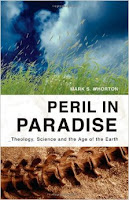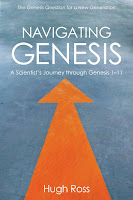Scientific Challenges to Christianity
Challenges to the Christian worldview come from many different directions, but one of the most common that I see is from the direction of the sciences. Many skeptics see the claims of creation in the beginning pages of the Bible and dismiss all its contents. It is important that we, as Christian case-makers, defend the proper view of these first chapters to remove the stumbling block from the scientifically-minded skeptic. Unfortunately, there is a heated controversy among Christians on the proper interpretation of these initial chapters and the proper interpretation of scientific discoveries. This list of books that I recommend is targeted at those Christians who are interested in the sciences and/or often speak to skeptics who raise scientific challenges against the Christian worldview. They will help think through the controversy and help remove scientific stumbling blocks when challenged by skeptics. Combined, they provide the Christian with a consistent view of creation that takes into account the sciences and remains faithful to the original intentions of the biblical authors. If you have never read these books, I do recommend reading them in the order presented. For your convenience, I have linked the book titles to my chapter-by-chapter reviews and provided a short reason why I chose the books for this list, but if you really want the details and wish to be blessed by the content of the books, you will need to pick up a copy (remember to check your local library!). Now, on to the list!Top 5 Books for Discussing the Bible, Creation, and Science
- Origin Science: A Proposal for the Creation/Evolution Controversy- Norman Geisler
- The Bible Among The Myths: Unique Revelation or Just Ancient Literature- John N. Oswalt
- Peril in Paradise: Theology, Science, and the Age of the Earth- Mark S. Whorton
- Navigating Genesis: A Scientist's Journey Through Genesis 1-11- Hugh Ross
- A Matter of Days: Resolving A Christian Controversy- Hugh Ross
Why Did I Choose These Books?
Origin Science: A Proposal for the Creation/Evolution Controversy
Science is the interpretation of raw observations of the natural realm. The sciences discover things that happen regularly and things that happen singularly in the past. It is important that the Christian understand the proper distinctions between the types of events that scientists attempt to discover and the different ways that these different types of events are established. Authors Norman Geisler and Kerby Anderson describe the history of the scientific method and describe a proper philosophy of science and how it is applied properly. It is quite common to misrepresent the distinction between observational science and historical science, which causes numerous misinterpretations of the data and incorrect conclusions to abound. They address this misunderstanding by clearly laying out differences to help the reader understand. Another common misunderstanding among Christians is the conflation of uniformitarianism and the principle of uniformity. This conflation causes many accusations among Christians toward other Christians of being "closet atheists" or "closet evolutionists." The authors clear up this misunderstanding with detailed differences as well. This book is a necessary beginning text for any Christian involved in scientific discussions because it gives them a proper philosophical and epistemological (knowledge) foundation by which to evaluate claims and challenges to discoveries in the sciences.
The Bible Among The Myths: Unique Revelation or Just Ancient Literature
Many discussions with skeptics about the Bible, in general, involve whether the stories in the Bible are records of actual historical events or if they are merely myths written by an ancient people- this includes the accounts of the creation of the universe and earth. While the first book that I recommended establishes a proper philosophy of science, this book establishes a proper philosophy of history. Since origin science (the discovery of past, singular events) looks at historical events, having a proper philosophy of history is also necessary. John N. Oswalt argues from the theistic worldview of the authors of the Bible that they believed what they recorded to be accurate historical accounts. Theism is purpose-driven, meaning that the God of theism has a goal for his creation, and it is important that His people be able to evaluate if they are on the proper trajectory to meet that goal; however, in order for a proper analysis to be made, what has happened in the past is a necessary requirement of such an analysis, so the accurate recording of history was of utmost importance to the theistic authors of the Bible. When Moses penned the creation accounts in Genesis, he believed them to be historically accurate. It is important that the Christian understand that the idea that the Genesis accounts of origins record actual, historical events is necessary of the theistic worldview of the author. Thus it is incumbent upon the Christian to find an interpretation of the Genesis accounts that recognize that they are historically accurate and is consistent with the discoveries of nature following the proper philosophy of science established in my first recommended book.
Peril in Paradise: Theology, Science, and the Age of the Earth
As we defend the truth of the Christian worldview in general and in the details, it is important that one detail we defend does not inadvertently undermine the whole of the worldview. One of those details involves God's purpose for the creation. Many Christians hold to what Mark S. Whorton has termed the "Perfect Paradise Paradigm." This paradigm posits that God's original purpose for this creation was that it be a perfect paradise for humanity. This paradigm is extremely popular among many Christians, and it has numerous implications for the debate around origins- specifically about animal death before the fall of Adam and Eve and the meaning of "very good" in Genesis 1. However, this particular paradigm also undermines the Christian worldview in numerous ways. Whorton goes through the theological and biblical problems with this paradigm to show that it is not compatible with Christianity and encourages Christians to avoid it. However, he does not merely leave the Christian without a paradigm for the purpose of the creation. He offers the "Perfect Purpose Paradigm," which posits that God has created this universe for His perfect purposes. He demonstrates how understanding God's purpose for this creation is to accomplish other purposes (it is a means not an end) which avoids all of the theological and biblical issues necessarily implied in the "Perfect Paradise Paradigm." He also addresses hermeneutical (biblical interpretation) challenges often raised against the paradigm by those who support the "Perfect Paradise Paradigm." When you read my review, please pay close attention to the one critique in my conclusion. Despite that, though, this book is necessary not only from an apologetic point of view (we do not want to undermine our entire worldview in one of our details), but if we have the incorrect paradigm, we will naturally read the creation accounts incorrectly and come to the wrong conclusion about what the author (and Author) meant to communicate about the historical events (establishing in the second recommended book) of our origins, and those incorrect conclusions will cause us to reject scientific discoveries that have been well established using the proper philosophy of science established in the first book.Navigating Genesis: A Scientist's Journey Through Genesis 1-11
In the first book, we saw a philosophy of science put forth that can be used to defend the truth of big bang cosmology. In the second book, we saw a philosophy of history put forth that requires that the Genesis accounts of creation are historically accurate. These are often seen to be at odds with one another because many Christians believe that the proper interpretation of Genesis 1 is that the universe is merely 6000 to 10,000 years old. In the third book we saw that a wrong paradigm will force such an interpretation of Genesis, but the correct paradigm allows for other interpretations that remain consistent theologically, historically, and scientifically. However, there must also be another level of consistency- biblical. Is there an interpretation of the Bible that is consistent with the philosophy of science (and its implications for discoveries of God's creation), the philosophy of history (and its implication that Genesis is an historically accurate account), and the "perfect purpose paradigm"? Astrophysicist Hugh Ross offers an interpretation of Genesis that maintains all those feature consistently, yet remains faithful to proper hermeneutical practices. In "Navigating Genesis" Ross takes the reader through each day of creation, explains the hermeneutics behind the interpretation, and shows how the events of each day have been verified independently by secular scientists ("enemy attestation," anyone?). In the second book that I recommended, Dr. Oswalt demonstrated that Moses believed that he was recording history. In this book, Dr. Ross shows that Moses actually DID record history accurately. Further, he shows that Moses recorded accurate history that NO one except God knew at the time, thus Dr. Ross argues powerfully that the accurate account of Genesis 1 is evidence of the divine inspiration of the Bible (further solidifying Oswalt's conclusion in his book about the historical accuracy of the rest of the Bible). In this book, he begins to bring the content of the previous three books together into a consistent picture of the Bible, creation, and science. But this interpretation, as was seen in Whorton's "Peril In Paradise" does have its critics, especially from fellow Christians.A Matter of Days: Resolving A Christian Controversy
For the purposes of this post, Dr. Ross' "Navigating Genesis" only spends a little over one hundred pages, because he does not spend much time addressing critics. That is where my fifth recommendation comes in. In "A Matter of Days" by Dr. Ross focuses the entire book addressing Christian critics of his interpretation of the Bible and nature. In this book, though, he does not go into the details of the events of each of the days of creation like he did in "Navigating Genesis," but he does not limit the discussion to Genesis either. Dr. Ross goes into much more detail of the biblical hermeneutics and addresses alternative interpretations that are often proposed. One of the great tests for the truth of a worldview is whether or not it is internally consistent. Dr. Ross builds his case from all the passages of scripture that speak about the creation, from both the Old and the New Testament. He addresses the most common biblical, theological, philosophical, and scientific challenges to his interpretation to show how his interpretation remains faithful to the original intent of the authors (and Author) of Scripture, maintains consistency with scientific discoveries, and remains logically consistent throughout the view.Many Christians accuse other Christians who use the big bang as evidence of God (via a beginning and incredible fine-tuning) of "compromise" in their interpretation of the Bible, but I believe that these books establish that such a view is far from compromising anything, including the Bible. These books will help you establish and defend a coherent and all-encompassing view that holds the testable accounts of creation in the Bible to be true. And these will help remove one large stumbling block between the scientific skeptic and his or her Creator and Savior, Jesus Christ.






